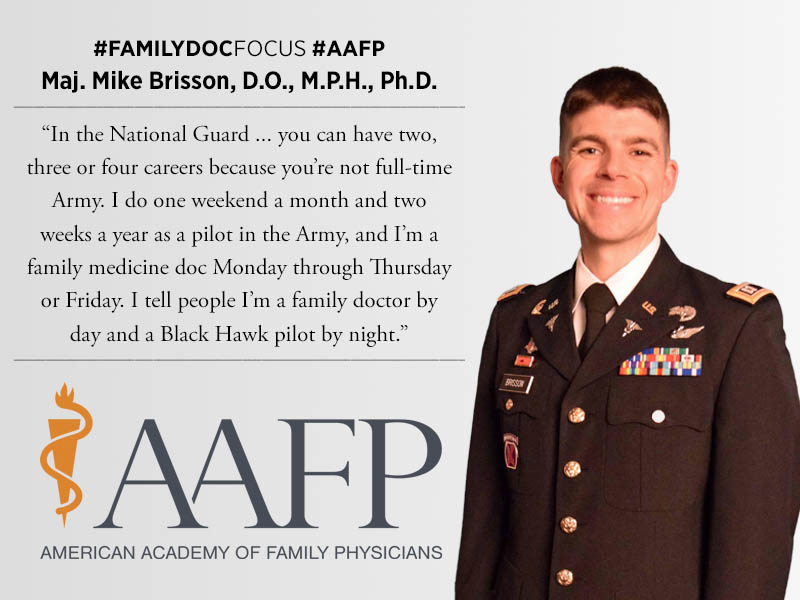Army Docs Inspired Pilot’s Path to Family Medicine
October 12, 2021, 1:11 p.m. David Mitchell — Maj. Mike Brisson, D.O., M.P.H., Ph.D., helped sick and injured people for years via nearly every mode of ground transportation imaginable, serving as a paramedic and firefighter, a bike medic at large outdoor events and even as a ski patrol volunteer. But it wasn’t until he found himself flying a Black Hawk helicopter loaded with doctors and injured soldiers that he thought about going to medical school.

Brisson was a 24-year-old U.S. Army pilot and aeromedical evacuation officer when he suffered chronic back pain during a deployment in Afghanistan. Brisson said flight surgeons used osteopathic manipulative medicine to relieve his pain, which allowed him to keep flying without the need for pain medication or invasive procedures.
“I was very fortunate that the majority of my flight surgeons were D.O.s, and they were able to do some OMM with me,” Brisson said. “We were flying dozens of hours a week, and my back was getting beat up pretty good, particularly with the night vision goggles, which put extra weight on your neck. I really had a good bond with a couple of my D.O. flight surgeons, who were in the back while I was up front flying. As a civilian paramedic and flight paramedic, I thought, ‘I want to be in the back, helping patients, too.'”
Brisson, 35, is still flying as pilot in the Alabama Army National Guard and helping patients as a chief resident in family medicine at South Baldwin Regional Medical Center in Foley, Ala.
“I see pilots in my family medicine clinic who are in their 40s and 50s, and they’re dealing with neck, shoulder, back and knee pain,” he said, “and I say, ‘Hey, let’s try some OMM.’”
Brisson, one of 12 winners of the AAFP’s Award for Excellence in Graduate Medical Education, is keeping a foot in the paramedic world, too, as a medical director and training officer for an ambulance service. He said his experience as a paramedic eased his transition to medical school.
“I think it helps absolutely, having that basis,” he said. “There’s a huge jump going from paramedic to medical school and residency, but the foundational knowledge is there and the skills are there. I thought it helped during medical school, particularly in the third and fourth years, because I already felt comfortable talking with patients. As a paramedic, 95% of your job is talking with the patient. I was fortunate to do my third- and fourth-year rotations in my hometown, where I also worked as a paramedic, so I was already familiar with the physicians and the staff in the hospital emergency department because I had been working with them for seven or eight years before I was a medical student.”
Brisson, who will graduate this summer, is slated to take command of a medical evacuation aviation unit with a detachment of three Black Hawk helicopters this fall in Montgomery, Ala. He said his residency program and the National Guard have been supportive of his dual roles.
“In the National Guard, versus active duty, you can have two, three or four careers because you’re not full-time Army,” he said. “I do one weekend a month and two weeks a year as a pilot in the Army, and I’m a family medicine doc Monday through Thursday or Friday. I tell people I’m a family doctor by day and a Black Hawk pilot by night.”
Brisson also credits his parents for supporting and influencing his career path. His father, Paul Brisson, M.D., was a U.S. Army surgeon and officer. But before medicine, the younger Brisson was intrigued by aviation. He was a frequent airport visitor because his mother, Debbie, now retired, had been a Boston-based flight attendant for United Airlines.
Less than two years after Brisson had his first flying lesson at age 14, terrorists hijacked four commercial airliners — including a United flight departing from Boston’s Logan International Airport — on Sept. 11, 2001.
“I had no inclination in the military at first,” he said. “It was really 9/11. I was 15. That was her flight. That was her traditional route, Boston to Los Angeles.”
Brisson met his wife, Sarah, another Black Hawk pilot, in the U.S. Army Reserve Officers’ Training Corps in college. They were both deployed to Afghanistan along with Brisson’s father in 2010-11.
“I thought it was really unique, that we would pick up patients and then have the potential that we’d be dropping them off at his forward surgical team,” he said. “He would patch them up, do the damage-control surgery, and then we would come back, pick them up and get them to more definitive care. We made the joke that there were more Brissons in Afghanistan than there were living in the United States.”